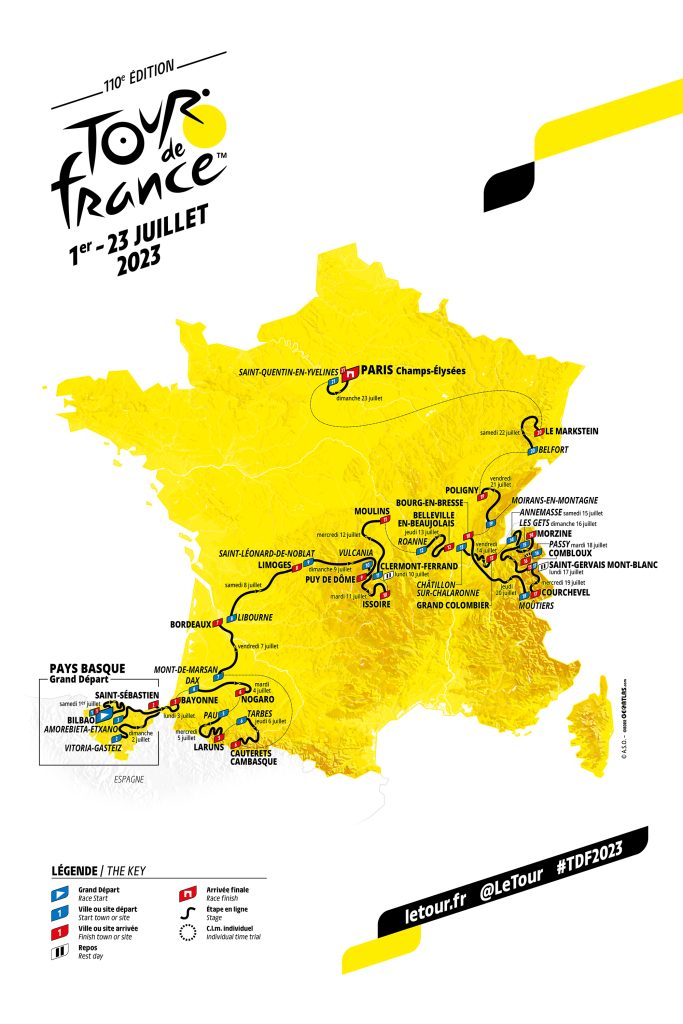
Key points:
Ø The Tour de France 2023 will hold its Grand Départ in the Basque Country, with a first stage in Bilbao on 1st July, and will finish in Paris on 23rd July, on completion of a 3,404-km route that will tackle the difficult slopes of the country’s five mountain ranges.
Ø The battle for the Yellow Jersey will witness a decisive and emotional episode on the Puy de Dôme, where a stage finish will be held 35 years after the victory of Denmark’s Johnny Weltz. The return to this legendary climb will be accompanied by the rise in importance of sites that will mark the Tours of the future, such as the Grand Colombier or the Col de la Loze.
Ø The sole time-trial on the Tour de France in 2023 will take place over 22 kilometres between Passy and the Combloux ski resort in Haute-Savoie. The sprinters will also have the opportunity to express themselves on finishes in Bordeaux, Limoges, Moulins, before the grand finale on the Champs-Elysées.
Bilbao on 1st July next year is where the Tour de France will celebrate its 120th anniversary. The Grand Départ in the Basque Country precisely offers the kind of scenery and roads that will pay tribute to the pioneers of 1903, because their successors, from the beginning of the race, will be plunged into a Pyrenean sequence with many twists in store, on both the Spanish and French sides of the border. The punchers will tuck into a menu of their favourite flavours on the roads of the Clasica San Sebastian (on stage 2), whilst the sprinters will have a free rein in Bayonne (on stage 3) as well as on the Nogaro circuit (on stage 4) and the climbers will already have to get to grips with the slopes on the stages finishing in Laruns (on stage 5) and on the Cambasque plateau near Cauterets (on stage 6). The rare starts of the Tour that take place in southern climes generally give rise to a dense programme, but this time the total of 30 climbs rated category 2 and above is chiefly due to the mountainous grand slam to be tackled this year, because each of France’s five mountain ranges will be visited by the pack.
In this collection of more or less demanding climbs, the one attracting most attention is likely to be the ascension of Puy de Dôme (on stage 9) whose roads will once again be open to the riders on the Tour (but not to their fans), 35 years after the last ascent to overlook Clermont-Ferrand. This reunion with the past, which brings back memories of the duel between Anquetil and Poulidor in 1964 or recalls the victory by Fausto Coppi in 1952 on the edition of the first high-altitude finishes, especially promises an initial and extremely tense battle between the pretenders for the title. The last four kilometres of tarmac before the finishing line, with an average gradient of almost 12%, could be the fuse that awakens the dormant volcano.
The leading lights of the pack will be following in mythical footsteps on the Puy de Dôme, but will also be testing each other’s mettle on peaks that are set to play host to the fiercest contests of the future. For example, an emerging legend will have pride of place on Bastille Day, with the battle taking place on the Grand Colombier (on stage 13), where the finishing line will be set up for the second time in the race’s history. Following the summit of the Jura, the big shots will fight for supremacy on the Col de la Loze, just before soaring down to the high-altitude airstrip in Courchevel (on stage 17), to conclude a sequence in the Alps where the strongest riders will simply become untouchable. The Col de Joux Plane pass and its subsequent descent before Morzine (on stage 14), the climb up to Le Bettex the following day (on stage 15), as well as the Côte de Domancy slope which is on the programme for the sole time-trial of this edition (on stage 16), will in effect make and break the hierarchy between the handful of riders concerned by the Yellow Jersey. The temperament observed among the expected favourites on all the roads of the cycling world suggests that they will not miss any opportunity to go head-to-head. The same will again be true on the penultimate day of the race, where the relief of the stage through the Vosges Mountains to the ski resort of Le Markstein will include 3,500 metres of climbing over a distance of only 133 km, taking in the Col de la Grosse Pierre and the ascensions of the Petit Ballon and the Platzerwasel (on stage 20). The leader designated in Alsace will be honoured the following day on the Champs-Elysées, where the race will close with a sprint festival that will have also visited Bordeaux, Limoges, Moulins and Poligny, allowing prestigious victories to be enjoyed in all the classifications!




